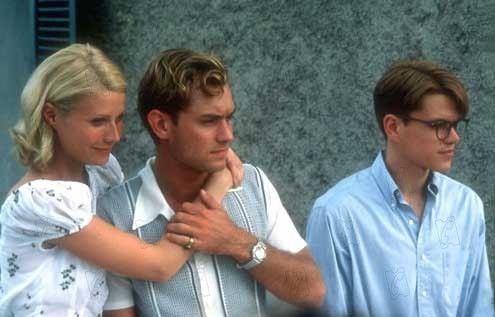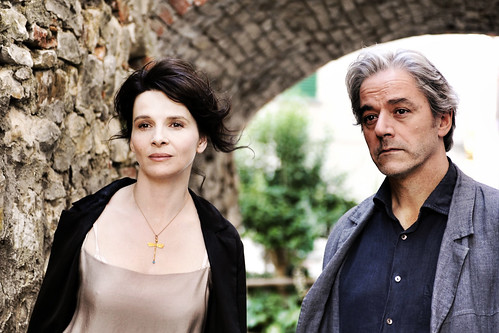The Omen
 Monday, June 6, 2016 at 10:11
Monday, June 6, 2016 at 10:11 One may wonder what would possess a director to remake a film scene-for-scene if that film did not have some kind of artistic appeal. The reasoning behind such a premise is woefully simple: only art can be re-enjoyed. The crash-bang-blow-up vehicles that continue to diminish our attention span draw the numbers they are supposed to attract then quietly subside, forever relegated to oblivion or lost amongst hundreds of clones. But art, true art, cannot be remade, although its sensation can indeed be reproduced. As opposed to the latest screen version of this controversial novel, Kubrick's opuscule was not so much an adaptation as a slender louver to a majestic gallery from which readers of the novel could discern little of the original (praise for the movie has in fact been scattershot, with some critics invariably convinced that older, plainer, and pruder is always the way to go). Yet despite its moral shortcomings, Lolita is still an artistic masterpiece with the fatal flaw of trying to sublimate pornography, a mistake that might be the caption for the entire twentieth century. Other good to great literary works have enjoyed intermittent revival because what lies at their heart – be it a moral lesson, an artistic vision, or something infinitely tragic and infinitely beautiful – is worth repeating and remembering. And while we gladly indulge ourselves in sweet memories when given the opportunity, sometimes it is important to recall other, darker materials within our world. And nothing is more powerful than mantic mysteries in engendering fear and trembling. So do we step and behold this remake released ten years ago today.
![]() We are taken into the family of thirtysomething Robert Thorn (Liev Schreiber), a tall, handsome, and successful American diplomat posted in Italy. He is there with his wife Katherine (Julia Stiles), ten years his junior and, as the film begins, pregnant with their first child. Even being unaware of the film's poorly kept secret, we understand that horror movies that commence with a birth will necessarily involve a terrible fate for all present, and the Thorns' predicament proves to be no exception. Mere moments after he is supposed to be basking in the bliss of fatherhood, Thorn is approached by the hospital's Catholic priest, Father Spiletto, who regrets to inform him that his son did not make it out the womb alive. Yet a solution exists: Spiletto mentions a child whose mother did not survive his birth, and with a few smooth words about placating Katherine's desire to have a baby, the changeling is retrieved and bestowed. What is very curious about this revolting moral decision is Thorn's indifference to the origin of the baby's mother – admittedly, out of desperation not snobbery. One would think that given science's insistence on genetic disorders, tendencies, and determination, an educated modern man would be loath to accept a fatherless child in a foreign maternity ward. But this twist has nothing to do with Thorn's noble intentions. The conceit is clearly designed as a choice: Thorn elects to bring the child he will call Damien into his home and in so doing, seals the destiny of all parties involved. Katherine is happy, he no longer has a spouse to comfort, and he can turn his attention back to what interests him most, namely his career.
We are taken into the family of thirtysomething Robert Thorn (Liev Schreiber), a tall, handsome, and successful American diplomat posted in Italy. He is there with his wife Katherine (Julia Stiles), ten years his junior and, as the film begins, pregnant with their first child. Even being unaware of the film's poorly kept secret, we understand that horror movies that commence with a birth will necessarily involve a terrible fate for all present, and the Thorns' predicament proves to be no exception. Mere moments after he is supposed to be basking in the bliss of fatherhood, Thorn is approached by the hospital's Catholic priest, Father Spiletto, who regrets to inform him that his son did not make it out the womb alive. Yet a solution exists: Spiletto mentions a child whose mother did not survive his birth, and with a few smooth words about placating Katherine's desire to have a baby, the changeling is retrieved and bestowed. What is very curious about this revolting moral decision is Thorn's indifference to the origin of the baby's mother – admittedly, out of desperation not snobbery. One would think that given science's insistence on genetic disorders, tendencies, and determination, an educated modern man would be loath to accept a fatherless child in a foreign maternity ward. But this twist has nothing to do with Thorn's noble intentions. The conceit is clearly designed as a choice: Thorn elects to bring the child he will call Damien into his home and in so doing, seals the destiny of all parties involved. Katherine is happy, he no longer has a spouse to comfort, and he can turn his attention back to what interests him most, namely his career.
Damien ages and nothing seems awry; we see the blissful trio doing blissful family things, giggling warmly all the while. By the time his son is five, Robert has been appointed Deputy Chief of Mission to the American Embassy in London, a rather fantastic feat for so young a diplomat. But then again, perhaps he's had some help along the way – and more help is coming. At precisely 6:06:06 am, the Ambassador perishes in a freak road accident with an oil tanker, leaving Thorn, still in his thirties, as the "youngest Ambassador in American history." A large estate outside of London awaits the Thorns who decide on a gala celebration of Damien's fifth birthday. Now about this Damien character. As I child I was always lectured about how horrible it was to expose underage actors to the trauma and nightmarish scenes so commonly incident to films involving evil, human or superhuman. Evidence for this edict is tremendous: so many young actors, having run and screamed from phantom killers their whole childhood, turn to drugs and other insidious outlets and end up ruining their lives in toto. Who knows what will befall Seamus Davey-Fitzpatrick; one hopes his fate will be kinder than that of so many of his predecessors. In any case, the lad is convincing in his irreverence towards the rules of the adult world. When his nanny commits suicide in his name at said gala event, he is neither as proud as a devil nor as scared as a child. No, this little beast couldn't care less about what happens to this nanny, as he is duly aware of the coming of another, the malefic Mrs. Baylock (Mia Farrow).
There are other odds and ends: a photographer (David Thewlis) whose work contains hints of how his subjects might meet their maker; a barbiturate-addled priest (Pete Postlethwaite) who chants weird verse of impending doom and claims to have seen Damien's birth mother; and the scholar Bugenhagen (Michael Gambon) who knows something about killing a demon. A few amendments to the original script are made – mostly, as it were, visual inserts – such as a series of nightmares that plague Thorn (one involves the slow closing of a bathroom cabinet mirror; I will leave it at that) and an allusion to the cowled figure in this film previously reviewed here. What ultimately takes place is far less surprising than the sidelights into what may have spawned this diabolical situation: the topical allusions at the film's beginning to recent natural and manmade disasters; calling upon Father Spiletto, who has survived a mysterious fire in the hospital that cost him his speech and half his face, in a lazaretto; the graveyard that Spiletto indicates the photographer and Thorn might want to visit (there is also a subsequent dream sequence with a hideously animate Spiletto cackling in a way that will hurt your sleep); and the identity of Damien's biological mother. The photographer and priest provide a sturdy contrast of what cannot be denied owing to photographic evidence and what cannot be empirically ascertained, because faith inherently means there is no ocular proof. It is this coin that the Thorns decide to flip, with unfortunately no winning scenario on either side. If the Thorns are a shade too young (Gregory Peck and Lee Remick were each substantially older than their counterparts in the original) it is both to appeal to a more adolescent crowd and underscore that meteoric rises might be owed to other shooting stars. Or other light bearers.






